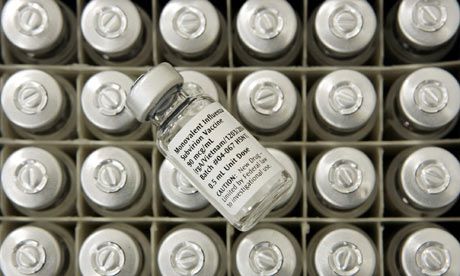
La reciente noticia de que los internos de un asilo en los EE.UU. fueron infectados por enfermedades de transmisión sexual en la década de los 40, ha causado indignación y preguntas acerca de quienes participan en la actualidad en los ensayos médicos. Aunque las normas para el reclutamiento de los pacientes se han endurecido, lo cierto es que hay estudios que prueban que los que no tienen seguro médico o los latinos (con salarios mucho más bajos) tienen una tasa de participación mucho más alta (que como es obvio incluye riesgos) que la población con mayores niveles de renta y cobertura de seguro médico
The unacceptable face of medical research
The Guardian, Saturday 23 October 2010
Ben Goldacre is the author of the Bad Science column in Saturday's Guardian and of the Bad Science website
News that the US infected asylum inmates with sexual diseases in the 1940s has caused outrage – and raised questions about participation in medical trials today

Bird flu vaccine Bird-flu vaccine: doctors find it difficult to recruit volunteers to try medicines, but infecting people without their knowledge, as was revealed this week, is regarded by many as unacceptable. Photograph: Alex Wong/Getty Images
This month it was revealed that US academics, funded by the National Institutes of Health, infected mentally incapacitated patients, prisoners, sex workers and soldiers from Guatemala with syphilis, gonorrhoea and chancroid during the 1940s.
There has been outrage, rightly. Since that time, regulations on consent have been tightened. But it's interesting to see who participates in medical trials today, and whether we would regard them as giving fully informed consent.
Recruiting patients is difficult; often, a majority of those who are eligible do not participate. This is, in some respects, a systemic problem, as we have been very poor at embedding the idea of routinely resolving uncertainties about which treatments are best into the everyday practice of medicine.
My point is not that these studies are dangerous, because they are not. But in the US, where many are still unable to afford healthcare, clinical trials are frequently marketed as a way to access doctors' appointments, scans, blood tests and treatment for free. One study compared insurance status among people who either agreed or refused to participate: participants are a diverse population, but notably they were seven times more likely to have no health insurance than those who declined. Another study looked at strategies to improve targeted recruitment among Latinos, a group on average with far lower wages and poorer healthcare: 96% agreed to participate, a rate far higher than anyone would normally expect.
In large clinical trials, a drug has usually been identified as being broadly safe – it may even be licensed already – and the study is designed to measure how effective the drug is, or to give better guidance on the balance between benefits and risks.
"First in man" studies are different: here the risks are greater and the picture is more stark. A drug, which has only been previously tested in animals, is given to a small number of healthy and disease-free people, mostly men, often unemployed, who then undergo painful, embarrassing and risky procedures – for money.
This is a new phenomenon. Until the 1970s, such studies were conducted on prisoners, who are captive, compliant, stigmatised and in need of money; when concerns were raised about their ability to give meaningful and uncoerced consent, paid volunteers made a ready alternative.
This strange new profession has only recently begun to be formally documented in the work of anthropologists such as Robert Abadie in his book The Professional Guinea Pig. The industry refers to these participants with the oxymoron "paid volunteers", and there is a universal pretence that they are not paid for their work, but merely reimbursed for their time and travel expenses. The participants themselves are under no such illusions.
Payment is often around $200 to $400 a day, studies can last for weeks or more, and participants will often do several studies in a year. Money is central to the process, and payment is often back-loaded so that you receive full payment only if you complete the study, unless you can prove that your withdrawal was because of serious side-effects. Participants are generally those with few economic alternatives who are frequently presented with lengthy and impenetrable consent forms.
Nothing could be as bad as the unacceptable coercion exposed in Guatemala. Plainly there is a need for drugs to be tested in humans, and although many of those participating in "first in man" studies have lives where the scale of the payment is hard to resist, they do participate of their own free will.
Equally, we should not allow ourselves to ignore what happens in healthcare today. In the US, in particular, the reality is stark: poor people participate in early tests so that rich people can have better drugs.
The unacceptable face of medical research | Comment is free | The Guardian
Ben Goldacre | guardian.co.uk
Ben Goldacre | guardian.co.uk






















.png)









No hay comentarios:
Publicar un comentario